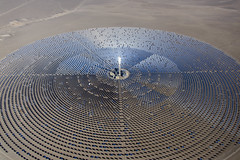The recent rise to prominence of Petrocultures and the Energy Humanities is fundamentally a response to the emergent dilemmas surrounding the predicted dire consequences of continuing with a planetary-level modernity constructed and powered by fossil-fuelled extractivism. An insistence on energy forms and their related infrastructures as critical phenomena for Humanities scholars has sparked new research exploring the long – and sometimes unconscious or under-determined – inter-relation between energy and culture, now registering in many intersecting fields and genres. In asking fundamental questions of the Humanities’ responsibility and relation to crisis-ridden issues of capital, political power, resource distribution, climate and environment, this work is also asking questions of critical and aesthetic practice; disrupting genre, form and periodization.
The genres of SF and the fantastic have considerable salience here, given the future-orientation of energic concerns as a significant strand in the Energy Humanities’ mission trajectory. We should expect work in the speculative mode to feature strongly, not only in offering radical ‘unimaginable’ alternatives but also by extrapolating and registering contemporary issues around energy. The consensus is on the necessity of some kind of transition, a view which is reliant, to some degree, on the power of imaginaries to present (and sometimes to prevent) speculative visions of life with alternative energy systems. A range of possible worlds and the attendant challenges and theoretical possibilities they offer is represented in the essays in this collection, which chiefly focuses on sf literature. They range from eco-dystopian or resource-pressurized worlds that remain inured in and subject to the extremes of fossil regimes; worlds extrapolating messy transitions and impasses between residual and emergent energy forms; and worlds presenting hopeful scenarios of more just and equitable modes of living with abundant or even inconceivably “clean” energy resources, from solarity to future food to wind transport and spaceship fuel. These essays demonstrate that novel and alternative energy imaginaries – involving both “powered-up” and “powered-down” visions of the future – proliferate across the histories and genres of sf/f. We have only just begun to source and extract such visions, and to debate their ability to engage and conceive the new modes of dwelling, moving, producing and consuming required in the face of climate change.
This Special Collection has been guest edited by Professor Graeme Macdonald, Department of English and Comparative Literary Studies, University of Warwick, UK and Dr Caroline Edwards, Department of English and Humanities, Birkbeck, University of London, UK.
Powering the Future: Energy Resources in Science Fiction and Fantasy
Neuromancer: The Cultural Logic of Late Fossil Capital?
Brent Ryan Bellamy
2019-09-13 Volume 5 • Issue 1 • 2019 • 54
Also a part of:
Special Collection: Powering the Future: Energy Resources in Science Fiction and Fantasy
Oil and Calories: Energy Paradigms in Paolo Bacigalupi’s Ship Breaker and ‘The Calorie Man’
Karl Kristian Swane Bambini
2019-09-13 Volume 5 • Issue 1 • 2019 • 57
Also a part of:
Special Collection: Powering the Future: Energy Resources in Science Fiction and Fantasy
‘Food from Nowhere’: Food, Fuel and the Fantastical
Chris Maughan
2019-09-13 Volume 5 • Issue 1 • 2019 • 58
Also a part of:
Special Collection: Powering the Future: Energy Resources in Science Fiction and Fantasy
Special Collections
-
Diversity and Competition within the Latin Church: The Secular-Mendicant Controversy and its Long Aftermath (13th–20th Centuries)
Thinking the Political: Theory, Literature, Practice
Poetry Off the Page: Intersecting Practices and Traditions in British Poetry Performance
Humour as a Human Right
Cultural Heritage Data for Research: Opening Museum Collections, Project Data and Digital Images for Research, Query and Discovery
Literature as Imaginary Archive: Ephemera and Modern Literary Production
Caliban's Mirror: Reflections of James Joyce and Oscar Wilde
Cultural Representations of Machine Vision
The Public Curatorship of the Medieval Past
Medieval Minds and Matter
Representing the Medieval in Popular Culture: Remembering the Angevins
The Politics and History of Menstruation: Contextualising the Scottish Campaign to End Period Poverty
Production Archives 03: Archival Practices
Production Archives 02: Production Contexts
Production Archives 01: Puppets for Action
Representing Classical Music in the Twenty-First Century
The Pathological Body: European Literary and Cultural Perspectives in the Age of Modern Medicine
Binary Modernisms: Re/Appropriations of Modernist Art in the Digital Age
Local and Universal in Irish Literature and Culture
Reading in Ruins: Exploring Posthumanist Narrative Studies
The Language of Perspective
Nancy Astor, Public Women and Gendered Political Culture in Interwar Britain
The Working-Class Avant-Garde
Colonialities in Dispute: Discourses on Colonialism and Race in the Spanish State
Powering the Future: Energy Resources in Science Fiction and Fantasy
Writers and Intellectuals on Britain and Europe, 1918–2018
Literature, Law and Psychoanalysis
Muslims in the Media
Encounters between Asian and Western Art in the 20th and 21st centuries: a liberating influence for Asia?
Waste: Disposability, Decay, and Depletion
Pride Revisited: Cinema, Activism and Re-Activation
New Approaches to Late Medieval Court Records
Utopian Art and Literature from Modern India
Right-Wing Populism and Mediated Activism: Creative Responses and Counter-Narratives
Representing Climate: Local to Global
Cultivating Spheres: Agriculture, Technical Communication, and the Publics
Freedom After Neoliberalism
The Medieval Brain
Remaking Collections
New Approaches to Medieval Water Studies
Imaginaries of the Future 01: Bodies and Media
Imaginaries of the Future 02: Politics, Poetics, Place
Imaginaries of the Future 03: Utopia at the Border
Postcolonial Perspectives in Game Studies
Station Eleven and Twenty-First-Century Writing
#Agreement20
What’s Left? Marxism, Literature and Culture in the 21st Century
New Voices in Jewish-American Literature
Authors, Narratives, and Audiences in Medieval Saints’ Lives
From TV To Film
American Literature & the Transnational Marketplace
Mnemosyne
Healing Gods, Heroes and Rituals in the Graeco-Roman World
The Abolition of the University
